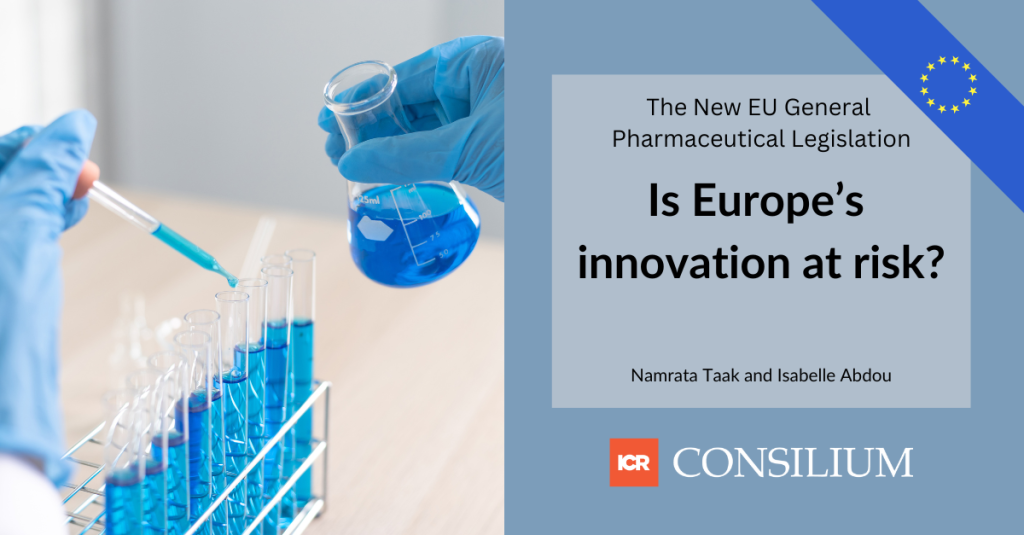
In April, the European Commission (EC) formally adopted the most significant reform in over two decades to the EU’s rules for medicines – named the General Pharmaceutical Legislation. The EC’s intention is to stimulate the development of innovative medicines and enhance the accessibility and affordability of medicines across Europe.
While there are some worthwhile goals behind this legislation, including efforts to future-proof the regulatory framework, address antimicrobial resistance and make medicines more environmentally sustainable, the industry has concerns that the legislation in its current form will, in fact, make Europe less competitive and less attractive for researching and developing medicines and vaccines.
Companies – large and small – need a strong system of incentives to navigate the immense challenges of developing innovative medicines. However, the proposed measures include a number of provisions which industry participants believe will actually serve to diminish innovation. These include reducing the number of years granted to drug developers for both regulatory data protection (the period during which data submitted for regulatory approval remains private) and market protection (the period during which no similar drug can be placed on the market).
Europe is already falling behind. This is evident from the numbers: it takes 426 days to approve a new medicine in Europe compared with 244 days in the US.[i] The US also spends $25 billion more on R&D than Europe does, compared with 20 years ago when it was $2 billion more.[ii]
Claus Zieler, Chief Commercial Officer at Astellas Pharma, and a member of the Board of the European Federation of Pharmaceutical Industries and Associations (EFPIA), is a strong advocate for pushing Europe to strengthen, rather than cut incentives and to ensure there’s a world-leading regulatory framework in place.
In a recent interview with Endpoints News, Claus commented: “If you really want to make Europe competitive, we will have to look for a strengthening of the regulatory data protection, not a weakening of the regulatory data protection. We have to reverse the current trend, that R&D investment in Europe is declining versus other regions.”
For biotech companies at an earlier stage of development, the regulatory timings for approval are further away on the horizon, but for Stéphane Boissel, CEO of SparingVision, a clinical-stage company pioneering genomics to save sight, a key concern relates to delays in early-stage regulatory reviews which are not addressed in the reform. Stéphane commented: “To enable successful R&D in Europe, regulatory resources need to be significantly strengthened, notably for the advanced therapy medicinal product (ATMP) field. This is crucial if we want to facilitate, and even accelerate access to innovative, potentially curative, medicines for patients who have no therapeutic options.”
Erik van den Berg, CEO of Memo Therapeutics, a late-stage biotech company developing best-in-class therapeutic antibodies for viral infections and cancer, believes that data exclusivity is not so important in R&D investment decisions. This is due to being primarily driven by the US market, and the strong and long-lived composition of matter patents beyond data protection. He also highlights that the legislation is stimulating the industry to become greener. However, he agrees the proposal could significantly affect the launch and availability of new drugs in Europe. Erik commented: “Given it takes 3-4 years to reach profitability after launch, the shortened exclusivity may make it unprofitable to bring new treatments to market. This change could deter investments, particularly in long-term projects for example originating from universities, and stifle European innovation as well as limiting access to medicines across the region – which is counterproductive to the legislation’s objectives.”
The European Parliament has confirmed the legislation will be finalised after the European elections, which took place in June, with discussions on the Commission’s proposal ongoing in the Council. Once the Council has adopted its position, three-way negotiations between the Commission, Parliament and Council can begin.
The message from the sector is clear. There is a need for all parties, including policy makers, politicians and industry, to come together to review what works and what doesn’t work, with the goal to find evidence-based solutions and an ecosystem with fewer hurdles and complications. Adopting a modern, collaborative approach will accelerate patient access to innovative medicines in Europe.
Read more about EFPIA’s position here: EFPIA responds to the European Parliament plenary vote: Despite improvements, the Pharmaceutical Legislation has a long way to go to restore Europe’s competitive edge.
———————-
[i] efpia-regulatoryroadtoinnovation_triptych_v07-final-neworder_pbp.pdf
[ii] Europe’s share of global medicines R&D shrinks by a quarter in 20 years – as sector’s declining trends continue (efpia.eu)



